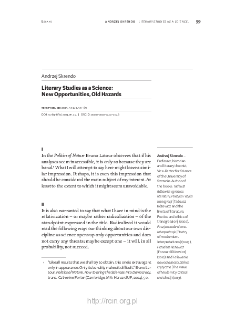- Search in all Repository
- Literature and maps
- Archeology
- Mills database
- Natural sciences
Advanced search
Advanced search
Advanced search
Advanced search
Advanced search

Object
Title: Literary Studies as a Science: New Opportunities, Old Hazards
Subtitle:
Publisher:
Place of publishing:
Description:
This project was accomplished with funds from the program“Development of Scientific Journals,” awarded by the Ministry of Educationand Science in 2021, decision number rcn/sp/0575/2021/1. ; 21 cm ; Eng. text, eng. summary
References:
1. Bowie, A. From Romanticism to Critical Theory. The Philosophy of German Literary Theory. Routledge, 1997.
2. Dilthey, W. Einleitung in die Geisteswissenschaften. Versuch einer Grundlegung für das Studium der Gesellschaft und ihrer Geschichte. B. G. Teubner Verlagsgesellschaft, 1990.
3. Edgerton, D. The Shock of the Old. Technology and Global History Since 1900. Oxford UP, 2008.
![]()
4. Fleck, L. Genesis and Development of a Scientific Fact. Ed. T. J. Trenn and R. K. Merton, trans. F. Bradley and T. J. Trenn, introd. T. S. Kuhn. University of Chicago Press, 2012.
5. Knorr Cetina, K. Epistemic Cultures: How the Sciences Make Knowledge. Harvard UP, 1999.
![]()
6. Krause, D. Luhmann Lexikon: Eine Einführung in das Gesamtwerk von Niklas Luhmann. Lucius and Lucius, 2001.
7. Kuhn, T. S. The Structure of Scientific Revolutions. University of Chicago Press, 1970.
8. Latour, B. Politics of Nature. How to Bring the Sciences Into Democracy, trans. C. Porter (Cambridge, MA: Harvard UP, 2004), 50.
9. Leavis, F. R. Two Cultures? The Significance of C. P. Snow, introd. S. Collini. Cambridge UP, 2013.
![]()
10. Lipszyc, A. “Dekonstrukcja uniwersytetu.” Dwutygodnik, February 14, 2017, http://www.dwutygodnik.com/artykul/5026-dekonstrukcja-uniwersytetu.html.
11. Luhmann, N. Die Wissenschaft der Gesellschaft. Suhrkamp Verlag, 1992.
12. Luhmann, N. “The Cognitive Program of Constructivism and a Reality that Remains Unknown.” In Selforganization. Portrait of a Scientific Revolution, ed. W. Krohn, G. Küppers and H. Nowotny. Springer-Science+Business Media, 1990.
![]()
13. Luhmann, N. Art as a Social System. Stanford UP, 2000.
![]()
14. MacKillop, I. F. R. Leavis: A Life in Criticism. St. Martin’s Press, 1995.
15. Marcum, J. A. Thomas Kuhn’s Revolution. An Historical Philosophy of Science [London: Continuum, 2005.
16. Markowski, M. P. Polityka wrażliwości Wprowadzenie do humanistyki. Universitas, 2013.
17. Nussbaum, M. C. Not for Profit. Why Democracy Needs the Humanities. Princeton UP, 2016.
![]()
18. Ortolano, G. The Two Cultures Controversy: Science, Literature and Cultural Politics in Postwar Britain. Cambridge UP, 2009.
19. Skrendo, A. “Wyprowadzenie z humanistyki.” Wielogłos 1 (2014).
20. Snow, C. P. The Two Cultures, introd. Stefan Collini. Cambridge UP, 2012.
![]()
21. Windelband, W. Die Grenzen der naturwissenschaftlichen Begriffsbildung, Eine logische Einleitung in die historischen Wissenschaften. Verlag von J. C. B. Mohr [Paul Siebeck], 1896.
22. Windelband, W. Geschichte und Naturwissenschaft. J. H. Ed. Heitz [Heitz & Mündel], 1904.
23. Windelband, W. Kulturwissenschaft und Naturwissenschaft. Sechste un siebente durchgesehene und ergänzte Auflage. Verlag von J. C. B Mohr [Paul Siebeck], 1926.
24. Zijderveld, A. C. Rickert’s Relevance. The Ontological Nature and Epistemological Functions of Values. Brill, 2006.
![]()
Relation:
Issue:
Start page:
End page:
Detailed Resource Type:
Resource Identifier:
oai:rcin.org.pl:242618 ; 0867-0633 ; 10.18318/td.2023.en.2.4/
Source:
IBL PAN, call no. P.I.2524 ; click here to follow the link
Language:
Language of abstract:
Rights:
Creative Commons Attribution BY 4.0 license
Terms of use:
Copyright-protected material. [CC BY 4.0] May be used within the scope specified in Creative Commons Attribution BY 4.0 license, full text available at: ; -
Digitizing institution:
Institute of Literary Research of the Polish Academy of Sciences
Original in:
Library of the Institute of Literary Research PAS
Projects co-financed by:
Programme Innovative Economy, 2010-2014, Priority Axis 2. R&D infrastructure ; European Union. European Regional Development Fund
Access:
Object collections:
- Digital Repository of Scientific Institutes > Partners' collections > Institute of Literary Research PAS
- Digital Repository of Scientific Institutes > Partners' collections > Institute of Literary Research PAS > Serials
- Digital Repository of Scientific Institutes > Literature
- Digital Repository of Scientific Institutes > Literature > Journals/Articles
Last modified:
Nov 22, 2024
In our library since:
Nov 22, 2024
Number of object content downloads / hits:
13
All available object's versions:
https://rcin.org.pl./publication/279484
Show description in RDF format:
Show description in RDFa format:
Show description in OAI-PMH format:
| Edition name | Date |
|---|---|
| Skrendo A. - Literary Studies as a Science: New Opportunities, Old Hazards | Nov 22, 2024 |
Objects Similar
Tötösy de Zepetnek, Steven Skrendo, Andrzej Zawiszewska, Agata

 INSTYTUT ARCHEOLOGII I ETNOLOGII POLSKIEJ AKADEMII NAUK
INSTYTUT ARCHEOLOGII I ETNOLOGII POLSKIEJ AKADEMII NAUK
 INSTYTUT BADAŃ LITERACKICH POLSKIEJ AKADEMII NAUK
INSTYTUT BADAŃ LITERACKICH POLSKIEJ AKADEMII NAUK
 INSTYTUT BADAWCZY LEŚNICTWA
INSTYTUT BADAWCZY LEŚNICTWA
 INSTYTUT BIOLOGII DOŚWIADCZALNEJ IM. MARCELEGO NENCKIEGO POLSKIEJ AKADEMII NAUK
INSTYTUT BIOLOGII DOŚWIADCZALNEJ IM. MARCELEGO NENCKIEGO POLSKIEJ AKADEMII NAUK
 INSTYTUT BIOLOGII SSAKÓW POLSKIEJ AKADEMII NAUK
INSTYTUT BIOLOGII SSAKÓW POLSKIEJ AKADEMII NAUK
 INSTYTUT CHEMII FIZYCZNEJ PAN
INSTYTUT CHEMII FIZYCZNEJ PAN
 INSTYTUT CHEMII ORGANICZNEJ PAN
INSTYTUT CHEMII ORGANICZNEJ PAN
 INSTYTUT FILOZOFII I SOCJOLOGII PAN
INSTYTUT FILOZOFII I SOCJOLOGII PAN
 INSTYTUT GEOGRAFII I PRZESTRZENNEGO ZAGOSPODAROWANIA PAN
INSTYTUT GEOGRAFII I PRZESTRZENNEGO ZAGOSPODAROWANIA PAN
 INSTYTUT HISTORII im. TADEUSZA MANTEUFFLA POLSKIEJ AKADEMII NAUK
INSTYTUT HISTORII im. TADEUSZA MANTEUFFLA POLSKIEJ AKADEMII NAUK
 INSTYTUT JĘZYKA POLSKIEGO POLSKIEJ AKADEMII NAUK
INSTYTUT JĘZYKA POLSKIEGO POLSKIEJ AKADEMII NAUK
 INSTYTUT MATEMATYCZNY PAN
INSTYTUT MATEMATYCZNY PAN
 INSTYTUT MEDYCYNY DOŚWIADCZALNEJ I KLINICZNEJ IM.MIROSŁAWA MOSSAKOWSKIEGO POLSKIEJ AKADEMII NAUK
INSTYTUT MEDYCYNY DOŚWIADCZALNEJ I KLINICZNEJ IM.MIROSŁAWA MOSSAKOWSKIEGO POLSKIEJ AKADEMII NAUK
 INSTYTUT PODSTAWOWYCH PROBLEMÓW TECHNIKI PAN
INSTYTUT PODSTAWOWYCH PROBLEMÓW TECHNIKI PAN
 INSTYTUT SLAWISTYKI PAN
INSTYTUT SLAWISTYKI PAN
 SIEĆ BADAWCZA ŁUKASIEWICZ - INSTYTUT TECHNOLOGII MATERIAŁÓW ELEKTRONICZNYCH
SIEĆ BADAWCZA ŁUKASIEWICZ - INSTYTUT TECHNOLOGII MATERIAŁÓW ELEKTRONICZNYCH
 MUZEUM I INSTYTUT ZOOLOGII POLSKIEJ AKADEMII NAUK
MUZEUM I INSTYTUT ZOOLOGII POLSKIEJ AKADEMII NAUK
 INSTYTUT BADAŃ SYSTEMOWYCH PAN
INSTYTUT BADAŃ SYSTEMOWYCH PAN
 INSTYTUT BOTANIKI IM. WŁADYSŁAWA SZAFERA POLSKIEJ AKADEMII NAUK
INSTYTUT BOTANIKI IM. WŁADYSŁAWA SZAFERA POLSKIEJ AKADEMII NAUK




































